How To Remove Brad Nails From Oak Trim
Painting trim is amid the most common painting tasks that homeowners undertake, correct forth with walls and cabinets.
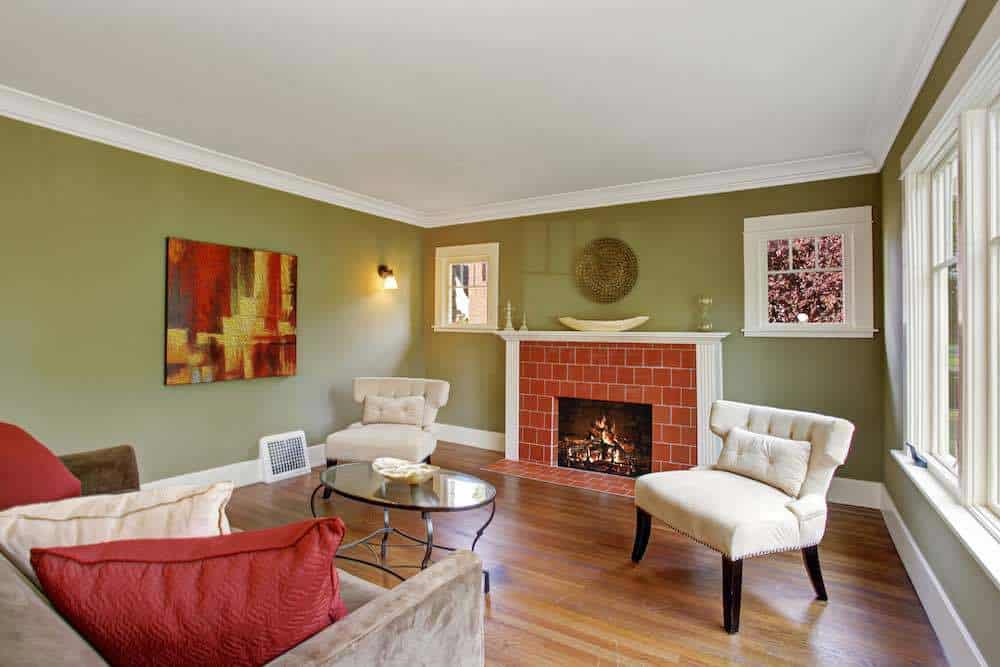
Painting your trim can completely modify the look and feel of a room, it can brighten the space or brand it more than elegant.
I've painted a lot of trim over my 15-twelvemonth painting career. I've brushed out trim in homes, I've sprayed trim and I've painted the trim in countless new construction homes. I take a lot of communication that will non simply make your trim look amazing when completed, but will speed up your painting process and requite yous a finished production that volition last for decades.
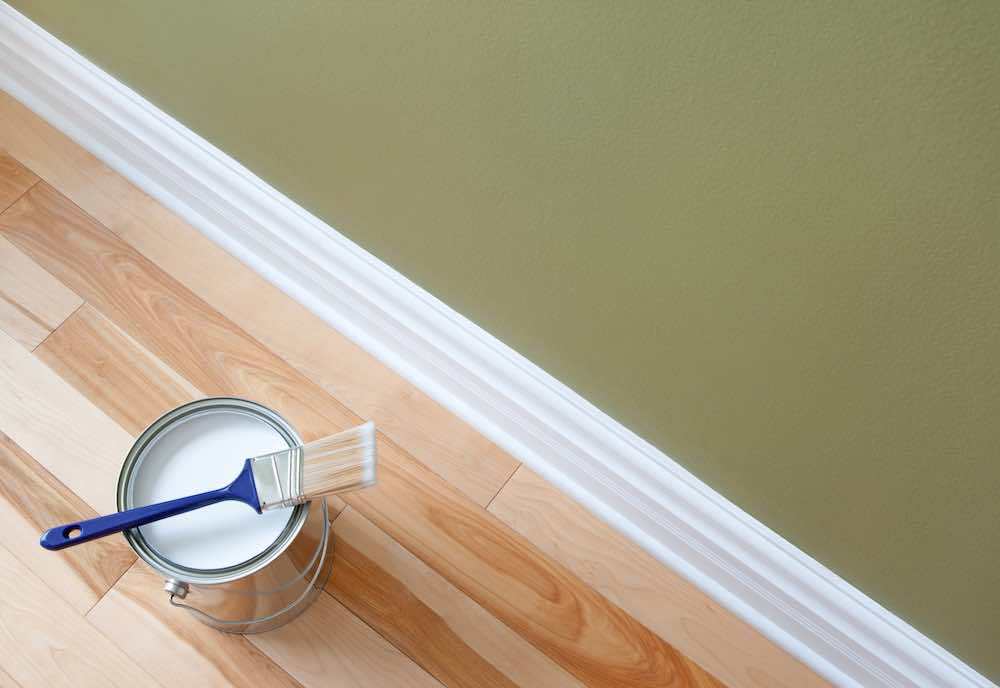
How To Paint Trim
There are a few unlike ways to pigment trim. You tin castor it after installation, you can spray information technology after installation or your can pre-stop the trim before installation (which I only recommend in very few certain circumstances).
Brushing Vs Spraying Trim
In theory, spraying your trim is e'er going to leave y'all with a improve finish. It will exist smoother and leave a fantastic looking finish. In new construction, I ever spray the trim, no questions asked.
In the reality of an existing home, spraying your trim volition cause you a ton of actress work while delivering results that while amend than brushing, are not significant enough to justify the extra work for 95% of the people out there, the possibility of overspray getting on areas you don't want it or the extra smell that will be in your home.
Too, let's be honest, nobody is going to go down on their easily and knees and look then close at your baseboard that they will exist able to tell that information technology has brush strokes in it. And fifty-fifty if yous can see them in the trim around your doors and windows, personally, I like the look of brush strokes, it adds character.
Fifty-fifty in my own home, I chose to castor all of our trim when I painted it. Information technology looks cracking and I am completely happy with it. To me, the difference between spraying and brushing was not worth the extra work.
Because of all this, I am not going to be going into particular on spraying in this article. Though most of the info is interchangeable for spraying and brushing, I'll just exist dropping a few random spraying tips here and there.

Painting Your Trim Index
- Paints and Tools I Recommend
- Fourth dimension Needed To Paint Your Trim
- Painting Trim Or Walls Starting time
- Step 1: Prepping The Room
- Stride two: Cleaning The Trim
- Step 3: Filling Nail Holes
- Step 4: Sanding The Trim
- Stride 5: Priming The Trim
- Step 6: Caulking The Gaps
- Footstep 7: Painting The Trim's First Elevation Coat
- Pace 8: Painting The Final Glaze
- Stride ix: Cleanup
Painting trim requires only a few bones tools and materials.
- Painter's Tape – For taping off floors and windows.
- v-in-1 Painter's Tool – Perfect for pressing tape, cut record, filling holes and other random tasks.
- Drop Cloths
- 2.5″ Pigment Brush – Want to learn everything in that location is about pigment brushes? Check out my posts All About Paint Brushes and How To Clean Your Paintbrush.
- Medium, Fine, and Extra Fine Grit Sanding Sponges – Each for different stages of the trim painting process.
- Shop-Vac
- Caulk and Caulk Gun – For caulking gaps and cracks.
- Spackling Paste – For filling boom holes in your trim.
Time Needed To Pigment Your Trim
Painting trim can really be quite a time-consuming project, especially if yous are doing window and door trim. Floor trim (baseboards) tends to be significantly faster than window and door trim due to the fact the window casing and door casing involve many surfaces, lots of caulking and more nail holes to fill.
A typical 15×15 sleeping accommodation with ane main door trim, closet door trim, base trim and 2 sets of window trim should take roughly ane hour to prep, 1 hr to prime and 2-4 hours to top coat.
A typical 15×15 bedroom should and then take you anywhere between iv-six hours. Once you are experienced, ii-three bedrooms worth of trim can easily be painted in a twenty-four hour period.
Curious how long it takes to pigment a room? Check out my article on How Long It Takes To Paint A Room.
Estimating the Time For Your Entire Trim Painting Projection
To estimate your entire trim painting projection, I typically plan on 1.v hours per set up of window trim, though unlike size windows and different casings require more or less time with some of the more complicated larger windows requiring 2+ hours.
For door casing and trim, assuming yous are painting both sides, I recommend budgeting 1.5 hours per door trim ready.
Finally, for base of operations trim, I recommend budgeting 1 hour per 25 feet of trim.
Painting Trim or Walls First
This is a question I oftentimes get from friends, family, and visitors: "Should I pigment the walls before I pigment the trim?".
The reply is to e'er paint the trim first.
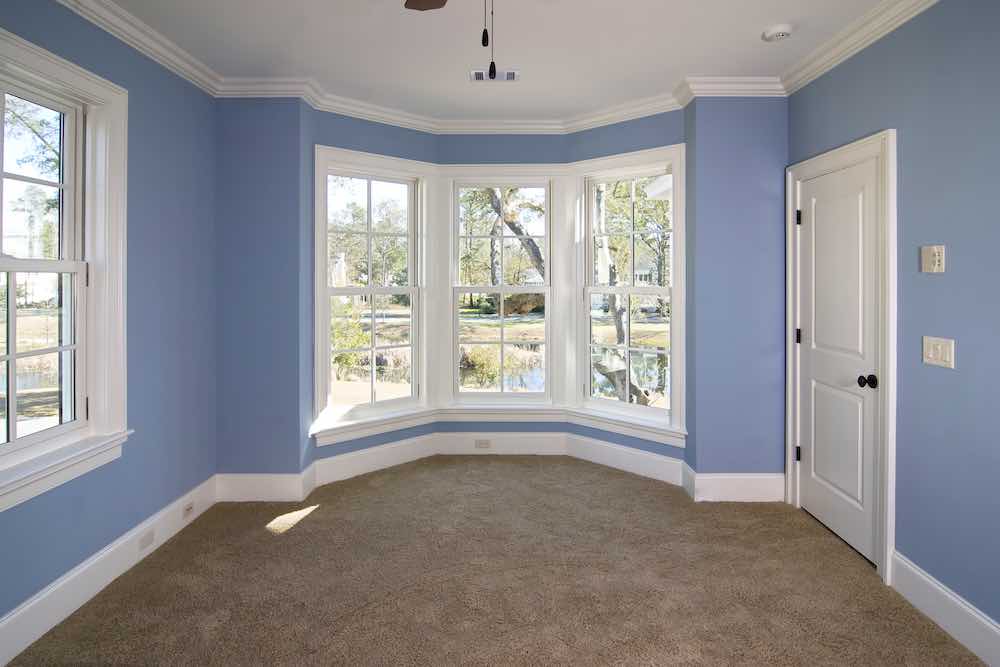
By painting the trim first, yous are saving actress prep time later on and creating a surface that will be easier to tape a perfectly straight line on afterwards.
The reason for this is that if you paint the walls last, then when you lot are painting the trim you can caulk the trim to the walls (which vastly improves the expect) and allow the trim pigment to period from the trim, over the caulk, and onto the wall.
Finally, trim paint (enamel) dries extra hard and this makes it so you tin tape off your trim and get a squeamish make clean tape line when painting your walls afterwards.
If you paint your walls first, taping the walls to paint the trim is extremely hard and the paint is usually not nearly as hard drying as trim paint, so the pigment can easily pull off when you pull the tape. Also, pulling the tape tin elevator not only the pigment only also the top layer of newspaper from your drywall and that is a disaster!
Footstep 1: Prepping The Room
The first thing you demand to do with any paint job is to start with proper prep piece of work.
To prep a room for trim painting I start by get-go clearing out the room and prepping off the floors.
If You Accept Carpet Floors
If y'all have carpeted floors, beginning by taking a roll of tape and ripping 1′ – 3′ strips of tape off the whorl and tucking the inside border under the trim but over the carpet. This is difficult to do without ripping a 1-3′ piece of tape off the roll.
Past tucking the tape under the trim but over the carpet, you are making sure at that place is a clean separation betwixt the trim and carpet that yous tin pigment up to.
After you lot've done this around the entire room, add a second row of 1.5″ tape effectually the room. Later this second row of tape, it will be much easier to pull a drop material upward to the tape where you lot are working.
Read more on how to pigment baseboards with carpet.
If You Have Solid Floors (forest, linoleum, tile)
For solid floors, accept your roll of painters tape and run a strip correct where the flooring meets the trim. Take your fourth dimension as a perfect line hither saves a lot of cleanup fourth dimension later.
After the first strip is laid down, I again similar to run a second strip around the room to give me more working space next to the trim (2-3″).
Once I accept taped off the floor, I volition run a whorl of 36″ rosin paper around the room instead of dragging around a drop textile. This acts equally a permanent drop fabric around the room and avoids the hassle of dragging effectually your drop and potentially smearing pigment drips from your drop cloth onto the flooring.
Prepping Windows and Doors
For windows, you'll want to run a strip of record where the trim/casing ends and either meets upwardly with vinyl on the window, glass or whatsoever fabric is not to exist painted.
Yous'll also want to remove any window coverings and cranks.
For door trim, you accept two options. Y'all tin completely remove the door and hinges, or place ii strips of record over the hinge, then outline the door swivel with a razor blade pocketknife and cut off the excess tape and so only the hinge has tape on it when completed.
Step two: Cleaning The Trim
Any quality paint job has to involve cleaning of the surface that is to exist painted and trim is no exception.
If the room is a relatively clean room, a vacuuming with a store vac should be sufficient.
If the room is a kitchen, where grease has built upwardly over the years, and then a mix of warm soapy water should be used to hand launder all the trim. I'g not talking about an hour or two of scrubbing, only 10 minutes or so and wipe downward all the surfaces that will be painted.
Brand sure to get over the surfaces a quick second time to remove whatsoever lather residue.
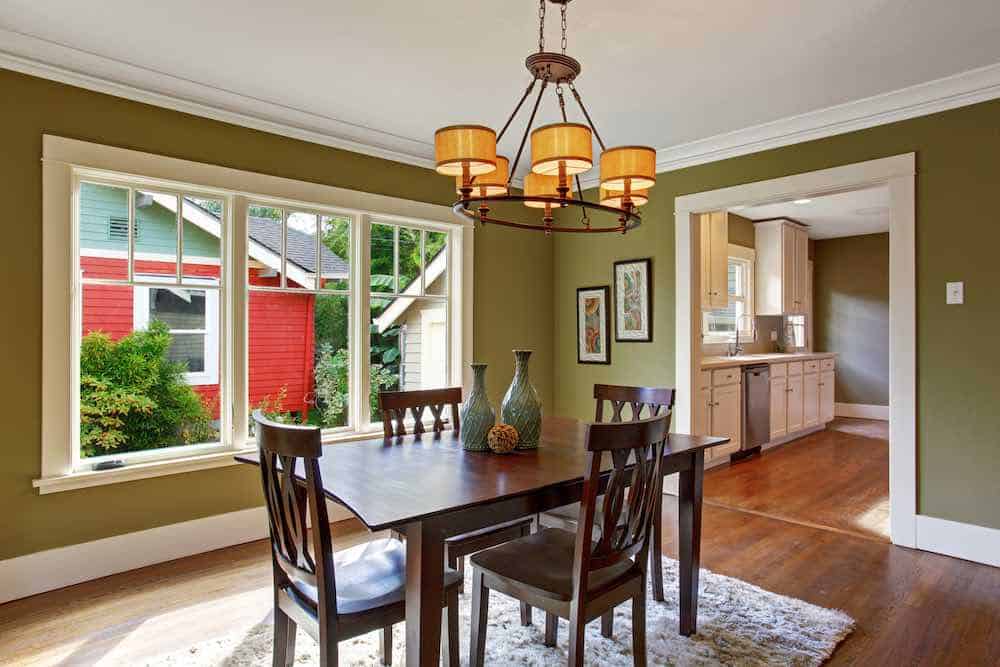
Step 3: Filling Smash Holes
If y'all are painting your trim white (or really any other color), every hole, gap and cleft is going to show after it has been painted. All holes will show as a contrasting black and be horribly noticeable.
I like to fill all my boom holes with spackling paste. It is easy to work with and sands actually easily.
This pace should take you no more than 5-10 minutes or so in a standard room.
Do not fill gaps between the wall and the trim with spackle or gaps between trim boards. These gaps require a flexible caulk or they will crack about immediately after the task is completed. Just hold off on caulking, for at present, caulking is footstep half-dozen for a reason.
If you lot were painting kitchen cabinets, this is where I would talk most filling the grain of the wood to ensure the smoothest stop possible. But this is trim. Trust me, not worth the fourth dimension and endeavour to fill up the grain on your trim.
Pace 4: Sanding The Trim
Sanding your trim before painting has multiple purposes.
First, information technology will smooth out the smash holes that y'all filled with spackling paste.
2nd, information technology smooths down the surface and helps the last product feel and expect better.
3rd, information technology breaks down any previous surfaces that may not exist porous enough to permit the primer to bond as well as information technology should. Sanding scuffs the surface and allows the primer to bail properly with the trim that is being painted.
For my first round of sanding, I like to apply medium grit 3M sanding sponges. The sponge foam forms nicely to the trim every bit I am sanding, keeps my hand away and prevents slivers, and is rough enough to chop-chop and finer set my surface for painting.
Subsequently y'all have sanded all of your trim, you'll demand to once once again shop vac everything. A cracking pigment job requires a flawlessly clean work area to prevent dust and debris from getting in your finish, then don't just vacuum off the trim, but vacuum the room.
Step v: Priming The Trim
After all the piece of work of getting your trim fix for paint, you finally get to bust our your paintbrush!
In that location are lots of dissimilar primers that will work great for priming your trim. I'm not going to tell you what you should or shouldn't use here, only rather requite you a few tips.
Annotation On Oil vs H2o-Based Paints For Trim
If you are going to apply an oil-based top glaze, you should use an oil based primer. If you are going to use a water based top coat, then you lot should utilise a water based primer (though you can opt to use an oil-based primer to help lock in stains improve so they do not bleed through into the water-based elevation coat).
Typically in a residential home, I am going to e'er recommend water-based paint. Oils tend to release besides many VOCs and stink upwardly your home. Oils are as well harder to make clean upwardly since they require paint thinner and you must properly dispose of that thinner. Water based paint tin can be cleaned upward in your laundry sink.
The difference in wait from h2o to oil-based paints is becoming smaller and smaller every year every bit water-based finishes become better and better.
When you offset brushing on your primer, endeavour to utilize long even strokes that go with the length of the trim. Try to come downwardly gently on the trim and lift off gently on each stroke.
The smoother your brush strokes are, the smoother your finish will expect when completed.
Your goal should be to utilise enough primer where you are applying it thick but not thick enough to cause runs. Try to detect that sweetness spot.
After the primer has had aplenty time to dry 100%, you'll desire to sand all of the trim again. Yous'll find that quality paint jobs require many dissimilar rounds of sanding!
For sanding the primer, I recommend using 3M fine grit sanding sponges. These sponges are a picayune flake finer than the medium grit I recommend using before priming and they go the primer feeling extra shine and set for the next stride.
After you sanding is complete, make sure to store vac all of the trim and the room to completely eliminate whatsoever grit in the environment.
Salvage This Post So You Can Reference It Later
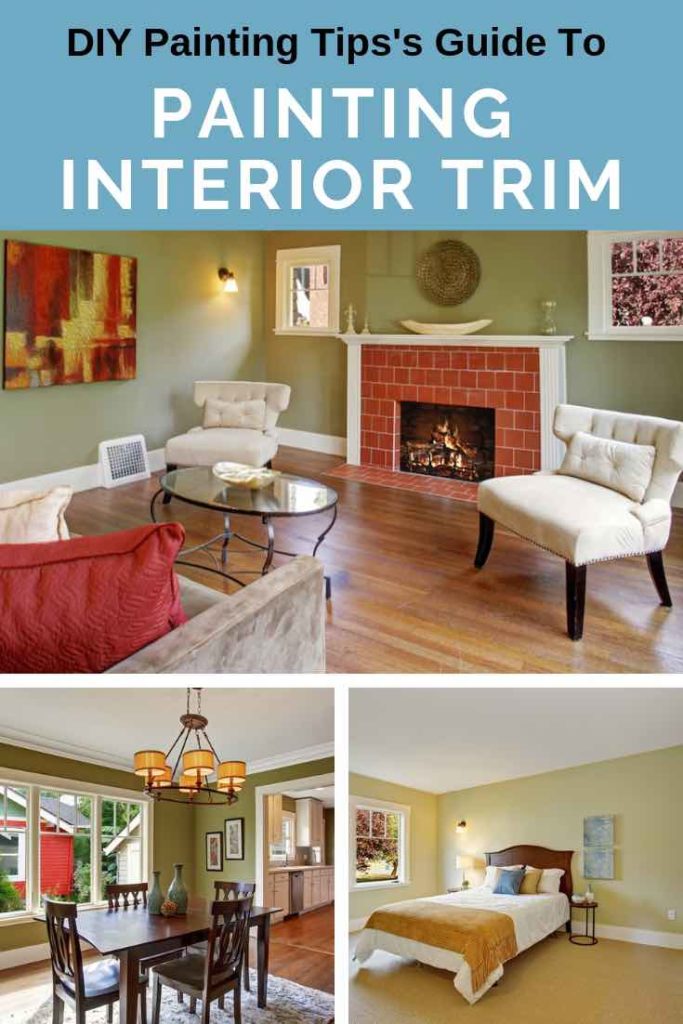
Step 6: Caulking The Gaps
Caulking the gaps in your trim vastly improves the terminal look of your painted trim. Gaps prove up every bit a blackness contrast to your white paint and the caulk makes the installation expect perfect. It also allows for a razor abrupt tape lines when yous go to paint your walls.
Many painters will tell you to caulk the gaps in your trim before you prime number, only I like doing it afterwards priming for a handful of reasons.
First, in one case all of your trim is primed, the gaps stand out like a sore thumb and you tin see exactly where the caulk is needed. This saves you fourth dimension from having to caulk areas where caulk is non needed.
Second, at this betoken the trim has been sanded twice and primed, your gamble for slivers has reduces dramatically.
3rd, the priming and sanding has made the trim very smoothen and thus allows y'all to lay a very fine smooth bead of caulk.
Fourth, the caulk is not-porus and paintable, it does not need to be primed, so you can pinnacle glaze correct over it without sacrificing immovability, quality or look.
How To Caulk Your Trim
I recommend using a dripless caulk gun, a wet cloth and a tube of flexible, indoor, white paintable caulk.
Cut a very small piece off the tip of the tube of caulk and make certain to cut it at an angle so yous tin lay the tip of the caulk neatly into the gap as you squeeze out the caulk.
I similar to run a bead of roughly 5′-10′ before stopping and going over the dewdrop with my wet rag to smooth it out. By running the rag over the caulk, it forces the caulk into the gap and leaves it looking perfectly polish.
Make sure to rinse out your rag ofttimes and keep it very wet.
Always outset your caulking in corners equally they are the most difficult to get looking dainty and clean.
Yous should use merely plenty caulk to fill the gaps, try not to have any caulk coming out or over the gaps. It is fine to accept the caulk run up the wall just a piffling scrap as well.
There is no sanding or anything else needed after caulking. Give your caulk ample time to dry out and them move on to top coating your trim.
Pace 7: Painting The Trim'south First Pinnacle Glaze
Now that all your prep, hole filling, priming, and caulking are completed, it'southward time to start brushing on the commencement top coat of paint onto your trim.
There is no magic or amazing tips here, simply castor on your top coat using long fifty-fifty smooth strokes. Endeavour to again discover that sweetness spot where you are applying plenty of top coat, but not then much that you have whatsoever runs. Avoid runs at all costs.
In that location are many different top coats that you tin apply for your trim that will work just fine. Window and door trim will require something a little more durable that baseboard trim though.
My personal favorites are Benjamin Moore's Satin Impervo and Sherwin William's Pro Classic enamels.
Both of these products are easy to apply, come in h2o-based versions and dry to a cute and durable cease!
Sand and Vacuum Your Tiptop Glaze
In one case your commencement pinnacle glaze has had time to thoroughly dry, and so information technology is time for your final round of sanding.
For this round of sanding I recommend using 3M Extra Fine sanding sponges.
I've institute that using their fine (or medium) sanding sponges can get out tiny scratches that tin can bear witness in the final glaze. All the same, the Extra Fine sponges will sand off any dust in the finish, give it a perfectly smooth finish and the scratches left in the cease are easily covered with the last superlative coat.
After sanding, make sure to shop vac the trim and the entire room so you lot are ready for the final top coat.
Step 8: Painting The Terminal Coat
The last step in painting your trim is also the easiest and quickest. Yous've prepped, primed, caulked, commencement coated and now it'due south time for the final coat.
Nothing new hither, make sure you employ even strokes and that no dust or debris lands in the finish.
Y'all should find that y'all need less paint and that it spreads easier likewise. This is due to the fact that the trim has a peachy barrier already on information technology and this top coat isn't being sucked upwardly into the previous coats as much.
Take your fourth dimension, pay attention to detail and you will have a corking looking finished production.
Step 9: Cleanup
Subsequently all of your painting is completed, cleanup is your final step. All you demand to know about cleanup is to wait until the paint has dried, but not cured.
If the paint is dry, you won't brand a mess while pulling record, paper and driblet cloths.
But if you wait too long (days) and have immune the paint to cure, any drips you lot discover that made their mode onto the flooring volition exist drastically harder to remove. Runs in the finish volition also be harder to fix.

Painting Trim In Conclusion
Painting your trim, whether base of operations trim, window trim or door trim, does require a skilful amount of fourth dimension. But with patience and attention to detail, information technology is a project that any homeowner can easily practice and accept peachy results.
Got some of your trim paint on the floor or carpet? Bank check out my commodity on How To Remove Paint From Nigh Whatever Surface.
Have any questions or comments? Leave them beneath, I always brand certain to answer every question!
Source: https://diypaintingtips.com/how-to-paint-trim/
Posted by: bensonrearach41.blogspot.com


0 Response to "How To Remove Brad Nails From Oak Trim"
Post a Comment